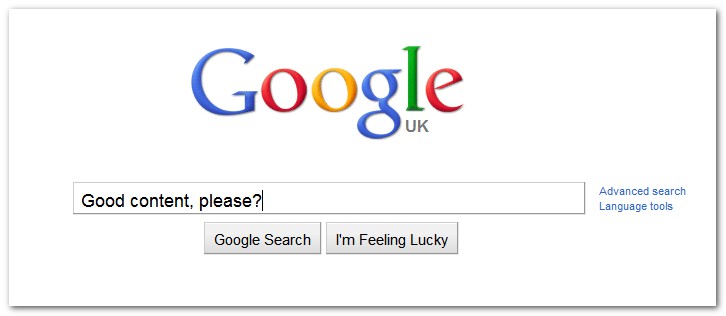Google’s latest algorithm change is all about degrading rankings for sites that produce low quality and non-unique content – ultimately, websites that provide absolutely no user value. The algorithm is live in the US version of the search engine and will soon be rolled out internationally. Search Engine Land is one of several sites to have published information about the sites most negatively affected. It comes as little surprise that websites such as Ezine Articles and Suite101 were affected. But what is surprising many is the fact that eHow.com, a website many thought would be one of the biggest losers in the change, has actually positively benefited.
So with no absolute clear indication from Google about what it deems “good content,” how do you know what’s good and what isn’t when it comes to your own website?
Unique Content
It’s an age old criterion but still applies. Regurgitating content that’s already been seen on hundreds of other websites is useless for your users and bad for your search engine rankings. Create your own!
Fresh Ideas
Rewording someone else’s article isn’t sufficient. That might be “uniquely worded,” but if the idea isn’t unique then it provides little value to your users and this seems to be more important since this major algorithm update. Google’s core aim is now about providing better results for users! This means saying something new – not just rewording something that someone else said. Carry out research of your own, put your own spin on things, share opinions and insights. Basically offer your users something on your website that they couldn’t get on thousands of other websites.
Mix It Up!
‘Content’ isn’t restricted to text. Mix it up. Go for video, images and audio. This is not only a good SEO strategy but enhances the experience of users.
Credible Content
Research your facts and figures. Make sure everything you claim to be fact is accurate and well researched. This might not necessarily be something that can be accounted for in an algorithm update, but your users will value it and this means they’re more likely to share it. The more people who share, the more potential there is for some valuable SEO benefit.
Up to Date
Keep content up to date. If your website relates to a topical area that is always changing and developing, then your content should reflect this. You don’t necessarily need to update your homepage to account for every single change in your industry but a blog is a great way of posting your opinions about related news or your own research and findings.
User Engagement
Content that encourages the user to engage is a winner. Polls, questions, debate… encourage your users to leave comments. If your content can inspire someone to take time out of their own day to leave a meaningful comment, then you’re doing something right.
Ultimately, your site’s content should be for humans. Think less about the search engines and more about users when you’re first drafting your content. Google Bot, after all, is unlikely to be browsing your blog with a coffee looking to enjoy a leisurely read.




